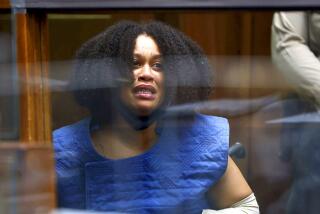Man to Face Manslaughter in Death of Ailing Wife
- Share via
In a move Earl Lindquist’s own attorney described as “compassionate,” prosecutors have charged the 67-year-old Thousand Oaks man with manslaughter rather than murder in the fatal shooting last month of his seriously ill wife.
“It’s just not a murder case,” Deputy Dist. Atty. Patricia Murphy said. “It’s an intentional killing without malice.”
Lindquist, a slender, balding man, appeared in court Friday to respond to the charges filed earlier this week. He wore his wedding band and a dark gray suit, occasionally rubbing his forehead. His son, daughter and son-in-law stood by to support him.
Lindquist has been permitted to remain free since days after the Jan. 21 shooting of 60-year-old Janet Lindquist in the couple’s condominium.
He turned himself in to authorities, confessed on videotape and is not considered a threat to the public, according to his lawyer and law enforcement authorities.
Lindquist did not enter a plea Friday. Instead, Ventura County Superior Court Judge Herbert Curtis agreed to postpone the arraignment until March 10, in order for Lindquist’s lawyer to gather more information.
Voluntary manslaughter carries a sentence of between three and 11 years in prison, but Deputy Public Defender Howard Asher said a judge also would have the discretion to sentence his client to probation with minimal time in the County Jail.
Janet Lindquist suffered for years from an ailment that was not terminal but plagued her with unrelenting pain and a constant ringing in her head, said Asher and neighbors of the Lindquists.
Asher said the ailment, a form of neuralgia, or nerve pain, was only worsened by a surgery that was supposed to lessen the pain and ringing. He blamed Lindquist’s health insurance provider, which he said refused to cover the woman’s preferred method of treatment, leaving her the option of a surgery that the family believes was botched.
“The woman was in constant agony day and night,” Asher said. “She was begging members of her family to put her out of her misery, especially [her husband].” She had bought a gun for protection. But as her pain grew worse, she wanted to turn the gun on herself. She was afraid she was too weak to aim it properly, Asher said.
Asher described his client as a loving husband with religious convictions who “did what he did out of love. And he believes he was obeying one of the commandments of his marriage, to love and obey. He is at peace with himself.”
Lindquist gathered with friends and relatives earlier this week for a memorial service for his wife. “He’s a very honorable man. He’s willing to take whatever punishment the court will give him,” Asher said.
Asher gave the district attorney’s office credit for treating the case as a mercy killing. “I think the D.A.’s office is showing some degree of restraint and empathy for Mr. Lindquist by filing what they did file,” he said.
Laurie Levenson, an associate dean at Loyola Law School, said in California, mercy killings are not punished uniformly but “very much on a case by case basis.”
“If you think about the [increasing numbers of] aging in California, we’re probably going to see more and more of these cases, instead of less, as time goes by,” Levenson said.
More to Read
Sign up for Essential California
The most important California stories and recommendations in your inbox every morning.
You may occasionally receive promotional content from the Los Angeles Times.













